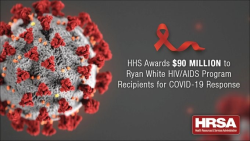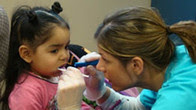
A Letter to HRSA Grantees

Dear HRSA Grantees,
Since the President signed the Coronavirus Aid, Relief and Economic Security Act into law March 27, HRSA has awarded a combined $1.4 billion through our Health Center Program, a reflection that your work remains integral to our nation’s history-shaping response to the coronavirus (COVID-19) pandemic.
And yesterday, HRSA’s Ryan White HIV/AIDS program awarded $90 million to 581 program recipients for COVID-19 response. These two HRSA flagship programs are key players in what the U.S. Surgeon General has described as “the test of our lives” and serving on the frontlines responding to the needs in their communities.
As HHS Secretary Alex Azar has noted, we have already seen heroic actions from countless people and organizations serving on the frontlines of the pandemic. And HRSA grantees are part of this courageous response.
With your help, and working collaboratively with tens of thousands of stakeholders across the country, I am certain that we will save and improve countless lives.
As a reminder, and to show our support for you, HRSA continues to updates its list of Frequently Asked Questions to provide the best available information about how COVID-19 grant dollars may be used and how we are providing organizational and grant flexibilities.
Feel free to contact your assigned HRSA project officer or grants management specialist for help. They are available and prepared to assist you through this extraordinary experience.
I commend you – the grantees – for all you are doing, and the great work you will yet do to combat the threat of COVID-19.
Sincerely,
Tom Engels
Administrator Health Resources and Services Administration (HRSA) |
HHS Awards $1.3 Billion to Health Centers in Historic U.S. Response to COVID-19

April 8 - Today, the U.S. Department of Health and Human Services (HHS), through the Health Resources and Services Administration (HRSA), awarded more than $1.3 billion to 1,387 health centers as part of a historic U.S. response to the Coronavirus Disease 2019 (COVID-19) pandemic. HRSA-funded health centers may use the awards to help communities across the country detect coronavirus; prevent, diagnose, and treat COVID-19; and maintain or increase health capacity and staffing levels to address this public health emergency.
On Friday, March 27, the President signed the Coronavirus Aid, Relief and Economic Security Act, or CARES Act, into law. This unprecedented legislation will help secure the resources needed to keep Americans safe from the coronavirus. HRSA is making these vital health center investments available immediately, as they are a key element of the nation's public health response to the COVID-19 pandemic.
|
HHS Awards $90 Million to Ryan White HIV/AIDS Program Recipients for COVID-19 Response

April 15 - Today, the U.S. Department of Health and Human Services (HHS), through the Health Resources and Services Administration (HRSA), awarded $90 million for Ryan White HIV/AIDS Program recipients across the country to prevent, prepare for, and respond to coronavirus disease 2019 (COVID-19). This funding is provided by the fiscal year 2020 Coronavirus Aid, Relief and Economic Security (CARES) Act, which President Trump signed into law on Friday, March 27, 2020.
“HRSA’s Ryan White HIV/AIDS Program recipients are serving on the frontlines of this pandemic, supporting clients and communities at higher risk from COVID-19,” said HHS Secretary Alex Azar. “This new investment is vital to enabling the Ryan White HIV/AIDS Program to continue responding to the increasing needs of their patients and communities during this challenging time. The Trump Administration remains committed to ending the HIV epidemic in America by 2030, and we will continue building on the success of the Ryan White HIV/AIDS Program to do it.”
|
Health Center COVID-19 Survey

Read the results of HRSA's weekly survey of health centers showing COVID-19’s impact on health center operations, patients, and staff. This national and state-level data helps us better understand how COVID-19 is affecting the communities health centers serve. HRSA uses this information to inform its policy and program development efforts, as well as sharing it with partners who provide technical assistance.
|
NHSC extends loan repayment and scholarship program application deadlines

HRSA’s National Health Service Corps (NHSC) has extended its application for all three loan repayment programs:
The applications now close on Thursday, May 21, 2020 at 7:30 p.m. EDT.
The NHSC Scholarship Program application is also extended through Friday, May 15, 2020 at 7:30 p.m. EDT.
Thank you to all our health care workforce for your committed service during this national crisis. Let us help you with loan repayment and your medical school debt. Apply today.
|
HRSA’s Center of Excellence for Behavioral Health Technical Assistance

HRSA has launched a new website with the aim of supporting HRSA-funded grantees to integrate substance use and mental health services in primary care settings. Eligible HRSA grantees are encouraged to create an account to access a variety of free, tailored training and technical assistance (TA) opportunities on integrated care topics such as:
Eligible grantees include the HRSA-funded health centers, Behavioral Health Professional and Paraprofessional Training Programs, Ryan White HIV/AIDS Program recipients and MCHB-funded Healthy Start grantees. Please contact behavioralhealthta@jsi.com with questions or specific TA requests.
|
National Pediatric Transplant Week

On April 19 through April 25, National Pediatric Transplant Week, we are focused on ending the pediatric transplant waiting list. In 2019, 1,923 children under the age of 18 received life-saving organ transplants. Yet despite this record-setting number, there are still more than 1,900 children waiting for a generous donor.
Join us as we honor and celebrate the generosity of our friends and neighbors who said yes to organ donation.
To learn more and to sign up visit organdonor.gov or donaciondeorganos.gov. Don’t forget to follow and “Like” Organdonor.gov and Donaciondeorganos.gov on Facebook.
|
National Practitioner Data Bank Waives User Fees to Support COVID-19 Response

HRSA is temporarily waiving query fees for health care entities to search the National Practitioner Data Bank (NPDB). This waiver supports efforts to mobilize and deploy health professionals during the COVID-19 pandemic by reducing costs and expediting credentialing, hiring, privileging, and licensing processes.
The NPDB fee waiver is retroactive from March 1, 2020, through May 31, 2020. The NPDB will issue query credits to reimburse entities that conducted queries (one-time and continuous) between March 1 and today’s announcement.
Learn more. For technical assistance, view the recording from the teleconference or contact the NPDB Customer Service Center.
|
HRSA Study Reports More than 1 in 5 Kids in the US Were Bullied in 2016-2017

A study by researchers in HRSA’s Maternal and Child Health Bureau explores the state by state prevalence of bullying using data from the combined 2016 and 2017 National Survey of Children’s Health.
Data from the study, published in Public Health Reports, show that more than 1 in 5 children and adolescents in the United States were bullied in 2016-2017. Specifically, parents reported that bullying affected 22.4% of children aged 6-11 and 21.0% of adolescents aged 12-17. The prevalence of bullying victimization among children by state ranged from 16.5% in New York to 35.9% in Wyoming and among adolescents ranged from 14.9% in Nevada to 31.6% in Montana. These data can inform state programs and policies to support bullying prevention efforts and services. Lydie Lebrun-Harris of the Office of Epidemiology and Research is the first author, and co-authors are Bethany Miller of the Division of Child and Adolescent Health and Laura Sherman of Division of Home Visiting and Early Childhood Systems.
Read the abstract in Public Health Reports.
|
Oral Health and Primary Care: Rooted in Evidence, Ripe for Innovation

Supported through HRSA’s cooperative agreement with National Organizations of State and Local Officials (NOSLO), the National Conference of State Legislatures posted a blog discussing the convergence of oral care and primary care. This is the third in a series of three oral health blog posts:
|































No hay comentarios:
Publicar un comentario